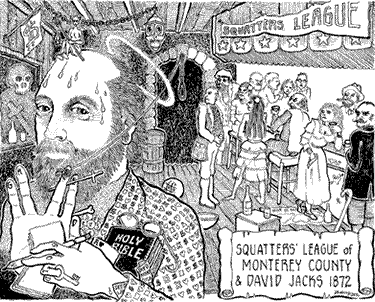Robert Louis Stevenson's work for the "Monterey Californian" taught him a great deal about our area, and he decided to use that information in a proposed book "Old And New Pacific Capitals" which he never completed. The most fascinating character in that book was David Jacks, a rich Republican land developer who had an iron grip on the local economy.
Stevenson wrote, "The town lands of Monterey are all in the hands of a single man. How they came there is an obscure, vexatious question, and rightly or wrongly, the man is hated with a great hatred. His life has been repeatedly in danger. Not very long ago, I was told, the stage was stopped and examined three evenings in succession by disguised horsemen thirsting for his blood. "

Jacks arrived in Monterey in 1850, two years after immigrating to America from his native Scotland. After working as a clerk at Mr. Boston's House Of Gold, he became county treasurer. As he got to know the citizens on his delinquent tax roles, he began to lend them money to pay their taxes, using their land as collateral. When the citizens missed loan payments he foreclosed and grabbed their land. He used legal chicanery on a moderate scale to acquire more land, but his magnum opus was the purchase of 30,000 acres of Monterey city lands in 1859.
Jacks and a partner, D. R. Ashley, were the sole bidders in an almost secret auction they had arranged, an auction which sold off nearly all the land on the Monterey Peninsula east to the Salinas River. The news of this deal enraged the entire town, especially since no money actually exchanged hands - Ashley claimed the city owed him exactly that amount.
Jacks, Monterey County's first and most infamous land developer, mostly sold his holdings in large tracts, letting others then subdivide it. He owned most of the land north of Carmel, but not Carmel itself. He also acquired the Chualar Ranch, south of Salinas, in payment of a loan. Some of the homesteaders on those 8,000 rich acres had worked the soil for decades, but had no legal papers to its ownership. When Jacks declared them "squatters" on his domain, they joined with others to form the Squatters League Of Monterey County.
In 1872, the League wrote Jacks "...you have been the cause of unnecessary annoyance and expense to the settlers... Now if you don't make that account of damages to each and every one of [us] within ten days, you son of a bitch, we will suspend your animation between daylight and hell." The League and the City of Monterey sued Jacks in Superior Court, but Judge Dorn in Salinas ruled that Jacks had not actually committed any civil crime in his realty transactions. In 1903, the California Supreme Court upheld Jacks, and in 1906 the U.S. Supreme Court also found him innocent of any crime.
Jacks' funeral in 1909 was a huge and somber affair, but he wasn't mourned by most locals. He was, however, grievously mourned by an adoring family. They inherited his vast financial estate, including 70,000 acres of land. His son Will, an 1894 graduate of Harvard Law School, then managed the Jacks Corporation and served as mayor of Monterey from 1905 to 1910. When the Corporation disbanded in 1919, Will's Lee, Vida, and Margaret Ann received some 10,000 acres and founded their own realty company. All of Pebble Beach was then purchased by Del Monte Properties, and much of the remaining lots in Pacific Grove went on the market.
Margaret Ann was the last of the Jacks family. The fact that there were no grandchildren to inherit the wealth was rumored to be a curse put on the family. To eradicate those and other rumors Margaret Ann spent the rest of her life making gifts of land to the City of Monterey. When she died in 1962 she left six million dollars to Stanford, including her family papers, and the 307 bound volumes of her father's correspondence and legal papers went to the Huntington Library.
Until Margaret Ann's death everything uncomplimentary to her father's memory was part of the secret and oral history of our area. She wanted her family to be remembered as shrewd and clever businessmen, but she didn't want it remembered that the Jacks earned that reputation at the expense of less fortunate citizens.
We wish to thank John Thompson for his contribution and it is reprinted as submitted without editorial comment or change.